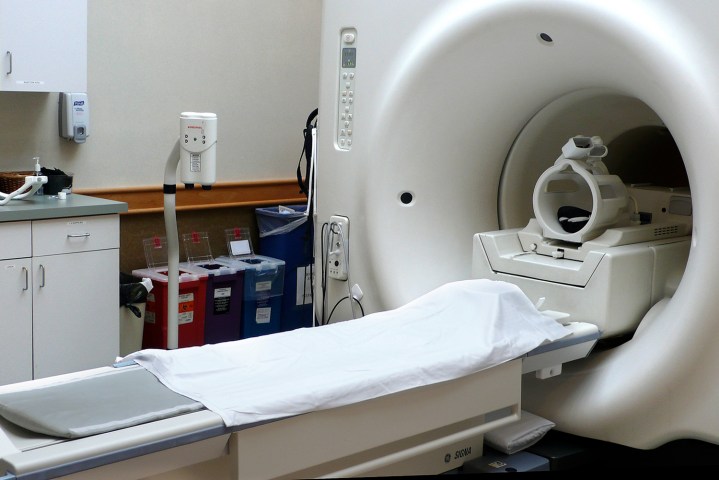
Jepsen, whose background and resume could leave most people gasping, is one of tech’s true, long-haul, entrepreneurial visionaries. With the chops to back up her words, if Jepsen says she’s going to do something, no matter what it is, people pay attention.
And now Mary Lou Jepsen has set her sights on creating a wearable MRI.
Dramatically improving MRI technology isn’t a new thought for Jepsen. “It’s such a big idea, it’s what I wanted to do for a decade. It’s why I went to MIT [Media Lab]. It’s why I went to Google. It turned out that Google really needed me to do some other stuff that was way more important to Google at the time. I’ve been incubating this since 2005 … and I clearly see how to do it and how to realize it in a few short years.”
If you’ve ever had an MRI, you know you have to go to a special site where the huge, multi-million dollar machine is kept under special conditions. Typically, you lie back on a narrow pad and you’re pulled into a large, tight tube. That’s the easy part. While the MRI does its thing, the noises are just obnoxious enough to keep you from hyperventilating.
Jepsen, who was diagnosed with brain cancer and had a tumor removed in 1995, has likely had her share of MRI scans. Perhaps it was just after a scan that Jepsen’s had her initial idea of creating a smaller, wearable version that would be much less bothersome and expensive, but without compromise in quality and usefulness.
As she was pondering the project for just over a decade, Jepsen had to wait for pieces to fall into place. Her project, she says, is on “the hairy edge of what physics can do.” It depends on the latest “in advances in everything from physics to optoelectronics to consumer electronics to big data and A.I. that can be combined to shrink the size, improve the functionality, and lower the cost of MRI.”
One question is, who would make the parts? The current plateau in smartphone and tablet sales frees up manufacturing capacity. Jepsen says, “What I see are the subcomponent makers being really hungry for what the new, new thing is. My big bet is we can use that manufacturing infrastructure to create the functionality of a $5 million MRI machine in a consumer electronics price-point wearable. And the implications of that are so big.”
One whole category of implications was inspired by the work of Jack Gallant at U.C. Berkeley. Gallant’s group has amassed a huge library of images of what people’s brain scans show when they look at a wide variety of images. To find out they have to load people into traditional MRI machines and scan their brains while they watch films. In Jepsen’s mind, the potential unlocked by knowing what brain waves look like when someone is looking at a particular image is almost unlimited.
Potential applications of that next huge technological step include helping stroke victims communicate, allowing creative people to do brain dumps directly to computers to capture their imaginations, and even communicating with animals. “So little is known,” Jepsen said. “Dolphins are supposed to be really smart — maybe we can collaborate with them.”
Editors' Recommendations
- Wearables don’t work the same on dark skin. It’s time to change that
- The best health and fitness gadgets
- Amazing wearable could detect epileptic seizures an hour before they strike
- Oculus, Tidal team up to livestream concerts in VR
- Oculus Quest 2 headset details have leaked




